INTERNACIONAL
Republican senators move to block Somalia terror funding until allies pay ‘fair share’

FIRST ON FOX : Fox News Digital has learned that the U.S. could withhold funding for the war against Islamist terror in Somalia until Europe, the African Union (A.U.) and the United Nations (U.N.) pay more of their «fair» share toward the cost of striking out and keeping the peace in the conflict-torn country.
These plans to «prohibit» the use of U.S. funds are key details, shown first to Fox News Digital, of a new bill to be introduced by three prominent Republican senators.
In line with President Donald Trump’s administration’s widespread moves to tighten fiscal controls in the U.S. and overseas, Sens. Jim Risch, R-Idaho., Chairman of the Senate Foreign Relations Committee Sen. Ted Cruz, R-Texas, and Sen. Rick Scott, R-Fla., are to introduce «the African Union Support and Stabilization Mission in Somalia (AUSSOM) Funding Restriction Act of 2025.»
This is «to safeguard U.S. taxpayer funds and hold the U.N. and A.U. accountable in African peace operations,» Risch told Fox News Digital.
TRUMP SAYS HE ORDERED AIRSTRIKES ON ISIS LEADERS IN SOMALIA
Al-Shabab terrorists conduct military exercises in northern Mogadishu’s Suqaholaha neighborhood of Somalia on Sunday, Sept. 5, 2010. (AP Photo/ Farah Abdi Warsameh, file)
The bill also seeks to mandate the U.S. to oppose any U.N. Security Council action which enables such funding.
The East African country of Somalia has been wracked for decades by attacks and insurgency from Islamist terrorists, both from ISIS and the al Qaeda-linked al-Shabab. In just the past five weeks, U.S. Africa Command reported that it has carried out four airstrikes; three against ISIS terrorists and one against al-Shabaab. At least one of these strikes, the command stated, was against multiple targets.
Chairman Risch told Fox News Digital, «The Trump Administration has taken decisive action to counterterrorist groups across Africa, and I’m very supportive.»
However, officials from the European Union, according to Risch, plan to skew payments for the AUSSOM peacekeeping and stablization operation more toward the U.S.; in other words, make the U.S. pay more than it should, he said.
«At the U.N., our European partners are looking to skirt their financial commitments to AUSSOM in Somalia by switching to a new imbalanced funding mechanism that pushes the burden on Americans,» he stated.
US–RUSSIA FLASHPOINT LOOMS OVER PUTIN’S PLANS FOR AFRICAN NAVAL BASE
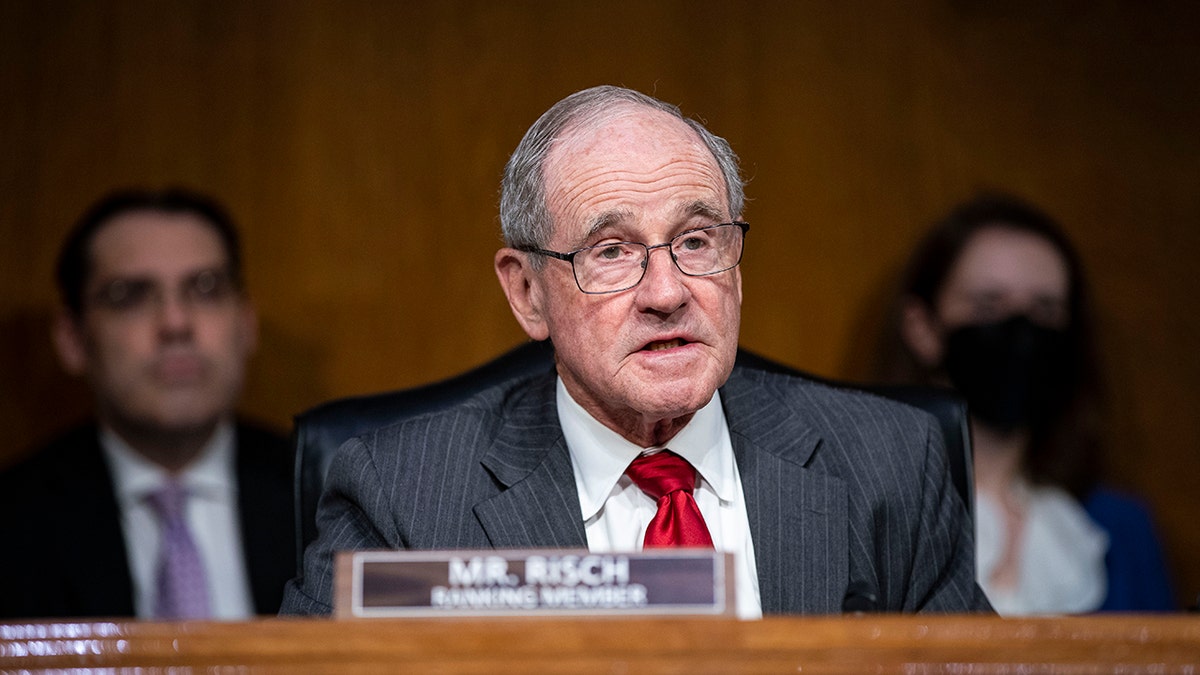
Chairman of the Senate Foreign Relations Committee, Sen. Jim Risch (R-Idaho), speaks during a Senate Foreign Relations Committee hearing on April 26, 2022 in Washington, D.C. (Al Drago-Pool/Getty Images)
«We can’t let that stand,» Risch continued. «This bill will prohibit U.S. contributions to AUSSOM under this new funding scheme, until the A.U. and the U.N. can prove that they are using the funds they have responsibly, and prevent Americans from being locked into perpetually funding a broken system.»
Risch said, «President Trump has ushered in a new era of American foreign policy where American taxpayer dollars will be used only to secure a safe and prosperous America. For far too long, our allies have taken America for a ride, and profited off of America paying the lion’s share for global security. Europe must continue to shoulder this burden.»
The other two senators sponsoring the bill, Cruz and Scott, also serve on the Senate Foreign Relations Committee.
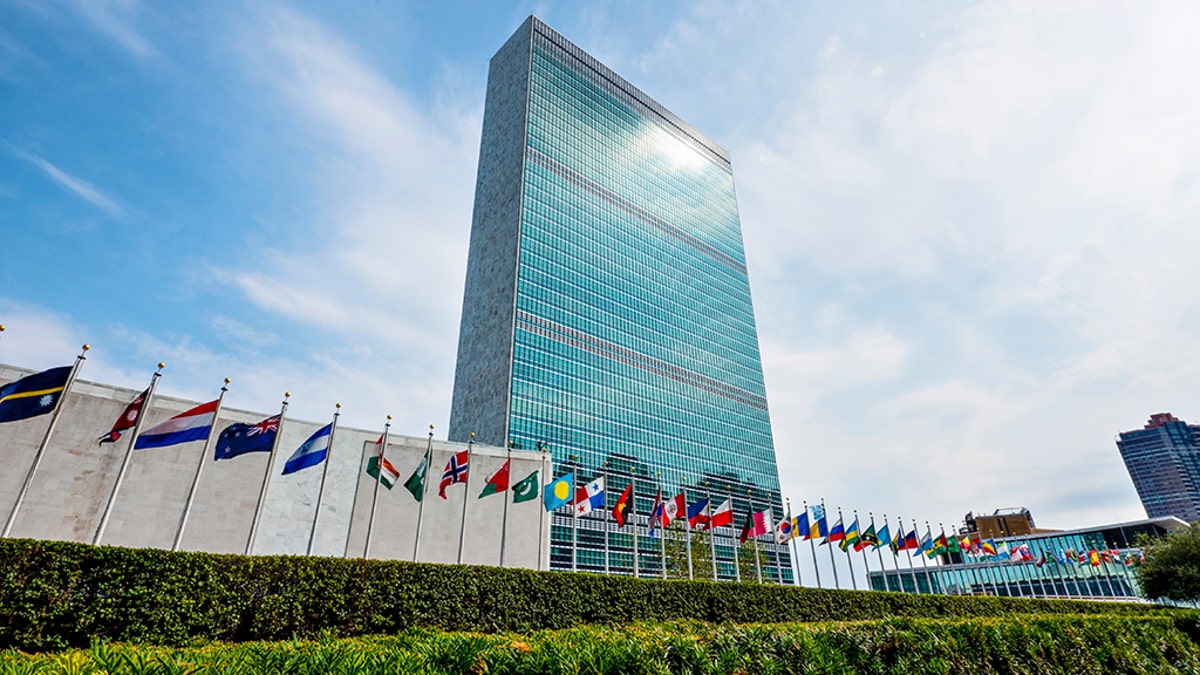
The U.N. headquarters in New York City. (iStock)
Scott told Fox News Digital, «The United States will not allow our tax dollars to be exploited by the U.N. while our partners refuse to pay their fair share, much less for a mission that fails to spend these dollars responsibly or transparently. I am proud to join my colleagues on the AUSSOM Funding Restriction Act to ensure Americans’ interests are put first, and their tax dollars spent wisely.»
CLICK HERE TO GET THE FOX NEWS APP
The specific aims of the bill that have been shown to Fox News Digital are:
- Protect U.S. Taxpayer Funds: Prohibit U.S. financial contributions to AUSSOM under UNSCR 2719 and mandate U.S. opposition to any U.N. Security Council action enabling such funding.
- Ensure Rigorous Oversight: Require the Secretary of State to conduct annual, independent assessments of the A.U.’s compliance with UNSCR 2719 criteria for all A.U.-led peace operations.
- Enhance Transparency and Accountability: Mandate comprehensive reporting to Congress on the assessment findings, AUSSOM’s performance and funding, and any U.S. contributions under UNSCR 2719.
- Strengthen Congressional Consultation: Expand existing State Department briefings to include specific updates on A.U. peace operations funded under UNSCR 2719.
INTERNACIONAL
Así es la autocracia

Desde que Donald Trump fue elegido de nuevo, he temido un escenario por encima de todos: que llamara al ejército contra quienes protestaban por sus deportaciones masivas, poniendo a Estados Unidos camino a la ley marcial. Sin embargo, incluso en mis imaginaciones más extravagantes, pensé que necesitaría un pretexto más convincente para desplegar tropas en las calles de una ciudad estadounidense —en contra de la voluntad de su alcalde y gobernador— que las protestas relativamente pequeñas que estallaron en Los Ángeles la semana pasada.
En un entorno posrealista, resulta que el presidente no necesitó esperar una crisis para lanzar una represión autoritaria. En cambio, puede simplemente inventarla.
Es cierto que algunos de los que protestan contra las redadas del Servicio de Inmigración y Control de Aduanas (ICE) en Los Ángeles han sido violentos; el domingo, un hombre fue arrestado por presuntamente lanzar un cóctel molotov a un agente de policía, y otro fue acusado de conducir una motocicleta contra una fila de policías. Dicha violencia debe ser condenada tanto por ser inmoral como por ser tremendamente contraproducente. Cada Waymo quemado o tienda destrozada es un regalo en especie para la administración.
Pero la idea de que Trump necesitaba desplegar soldados en las calles de la ciudad porque los disturbios se estaban descontrolando es pura fantasía.
«Hoy, las manifestaciones en toda la ciudad de Los Ángeles se mantuvieron pacíficas, y felicitamos a todos aquellos que ejercieron sus derechos bajo la Primera Enmienda con responsabilidad», declaró el Departamento de Policía de Los Ángeles el sábado por la noche. Ese mismo día, Trump anuló la decisión del gobernador Gavin Newsom y federalizó la Guardia Nacional de California, amparándose en una ley poco utilizada destinada a lidiar con «la rebelión o el peligro de rebelión contra la autoridad del gobierno de Estados Unidos».
Luego, el lunes, con miles de efectivos de la Guardia Nacional desplegados en la ciudad, el gobierno anunció el envío de 700 marines. La policía de Los Ángeles no parece querer a los marines allí; en un comunicado, el jefe de policía Jim McDonnell declaró: «La llegada de fuerzas militares federales a Los Ángeles, en ausencia de una coordinación clara, representa un importante desafío logístico y operativo para quienes estamos encargados de salvaguardar esta ciudad». Pero para Trump, salvaguardar la ciudad nunca fue el objetivo.
Es importante comprender que, para este gobierno, las protestas no necesitan ser violentas para ser consideradas un levantamiento ilegítimo. El memorando presidencial que llama a la Guardia Nacional se refiere tanto a actos violentos como a cualquier protesta que «inhiba» la aplicación de la ley.
Esta definición parece incluir las manifestaciones pacíficas en torno al lugar de las redadas del ICE. En mayo, por ejemplo, agentes federales armados irrumpieron en dos populares restaurantes italianos en San Diego en busca de trabajadores que se encontraban sin permiso en el país; esposaron a los empleados y detuvieron a cuatro personas. Mientras lo hacían, una multitud indignada se congregó afuera, coreando «¡vergüenza!» e impidiendo la salida de los agentes durante un tiempo. Bajo la orden de Trump, el ejército podría identificar a estas personas como insurrectos.
El gobierno, después de todo, tiene todas las razones para querer intimidar a quienes pudieran participar en la desobediencia civil. Las protestas violentas le hacen el juego; las pacíficas amenazan la narrativa absurda que intenta imponer a Estados Unidos.
Basta con mirar hasta qué punto se está silenciando a David Huerta, presidente del Sindicato Internacional de Empleados de Servicios de California. La semana pasada, Huerta fue arrestado tras sentarse en una acera y bloquear una puerta mientras protestaba contra una redada de inmigración en un centro de trabajo en Los Ángeles. Mientras estaba detenido, fue derribado al suelo, lo que provocó su hospitalización.
El lunes, el Departamento de Justicia lo acusó de «conspiración para obstaculizar a un oficial», un delito grave que conlleva una pena máxima de seis años de prisión.
Trump también exigió el lunes el arresto de Newsom. Si viéramos todo esto en cualquier otro país —soldados enviados para reprimir la disidencia, líderes sindicales arrestados, políticos de la oposición amenazados—, sería evidente que la autocracia ha llegado. La pregunta ahora es si los estadounidenses que odian la tiranía podrán reaccionar.
Muchos han especulado que la confrontación en Los Ángeles le hará el juego a Trump, permitiéndole presentarse como un defensor de la ley y el orden que somete a las bandas criminales. Quizás tengan razón; Trump es un maestro de la demagogia con un don para crear las escenas de conflicto que sus partidarios anhelan. Ahora sabemos que el Dr. Phil (n. de la r.: personalidad televisiva de Estados Unidos) estuvo sobre el terreno con el ICE durante las redadas que desencadenaron los disturbios en Los Ángeles, grabando un especial en horario de máxima audiencia. La administración parecía querer un espectáculo.
Sin embargo, la opinión pública no es inamovible, por lo que es importante que todos los que tienen una plataforma —políticos, veteranos, líderes culturales y religiosos— denuncien los excesos autoritarios de la administración.
Funcionarios de la administración como Stephen Miller promueven la idea de que Los Ángeles es «territorio ocupado», como lo demuestran las banderas extranjeras que portan algunos manifestantes. Los estadounidenses que aún albergan esperanzas democráticas deberían decir, tan alto y con tanta frecuencia como puedan, que esta es una mentira insultantemente estúpida para justificar una toma de poder dictatorial. Quizás resulte que la verdad no sea rival para la propaganda de la derecha, pero si ese es el caso, ya estábamos perdidos.
c.2025 The New York Times Company
INTERNACIONAL
Newsom addresses Trump’s threat to arrest him as the two spar over LA riot response: ‘Point of no return’
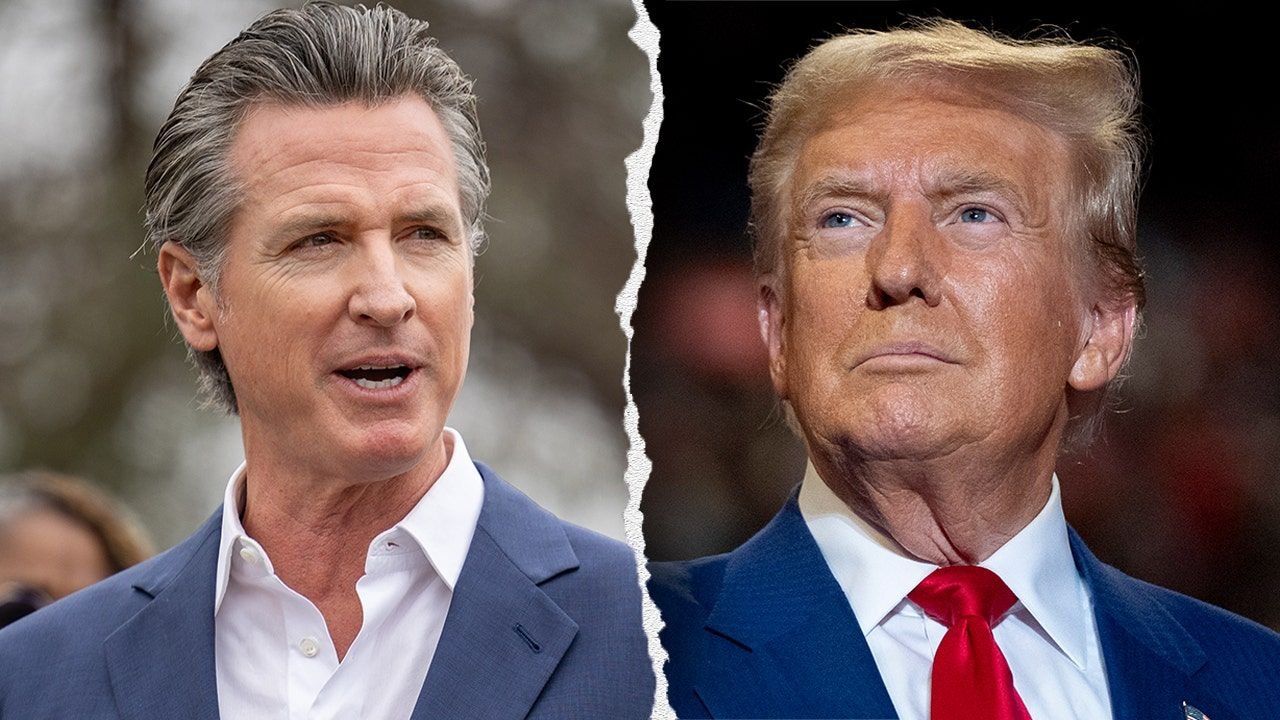
NEWYou can now listen to Fox News articles!
California Gov. Gavin Newsom, a Democrat, said he has crafted a plan in the event the Trump administration arrests him after he and President Donald Trump went head-to-head over the handling of the immigration protests in Los Angeles.
Newsom said he and his team have «processed» what it would mean for him if the Trump administration secured a federal warrant for his arrest, Newsom said in an interview with the «Pod Save America» podcast hosted by former Obama administration officials that aired Monday night.
«What’s so absurd about that question is I’ve actually thought about it,» Newsom said when asked about preparations in the event authorities take him into custody.
«The fact that we are even having that conversation with our folks, and have had that conversation with our folks in the United States in 2025, I mean, it says everything you need to know about who’s in the White House right now,» Newsom said.
TRUMP GIVES BLUNT RESPONSE TO NEWSOM DARING HOMAN TO ARREST HIM: ‘I WOULD’
Newsom also addressed the arrest threats in an interview with The Washington Post published Tuesday, signaling that the relationship between the two had reached a point beyond repair.
«He just threatened my arrest. One would assume, or presume, that’s the point of no return,» Newsom told The Washington Post. «I’m constitutionally capable of working with people, even those that call for my arrest. So, I remain resolved in that respect, as I remain resolved to have the backs of kids whose lives are being threatened by his authoritarian tendencies.»
President Donald Trump and first lady Melania Trump walk with California Gov. Gavin Newsom after arriving on Air Force One at Los Angeles International Airport Jan. 24, 2025. (Mark Schiefelbein/AP)
Trump’s border czar, Tom Homan, first suggested in an interview with NBC News Saturday that Newsom and Los Angeles Mayor Karen Bass could face arrest if they hamper any federal efforts to deport illegal immigrants.
In response, Newsom appeared to taunt Homan to take him into custody.
«He’s a tough guy. Why doesn’t he do that? He knows where to find me,» Newsom told MSNBC News Sunday. «That kind of bloviating is exhausting. So, Tom, arrest me. Let’s go.»
When asked about threats to arrest Newsom, Trump told reporters Monday that Newsom’s primary crime «is running for governor because he’s done such a bad job,» adding he would arrest Newsom if he were Homan.
Newsom voiced disappointment in response to Trump’s remarks and cautioned the threats amounted to a step toward authoritarianism.
NATIONAL GUARD TO BE DEPLOYED IN LOS ANGELES COUNTY AS ANTI-ICE PROTESTS RAGE: BORDER CZAR TOM HOMAN
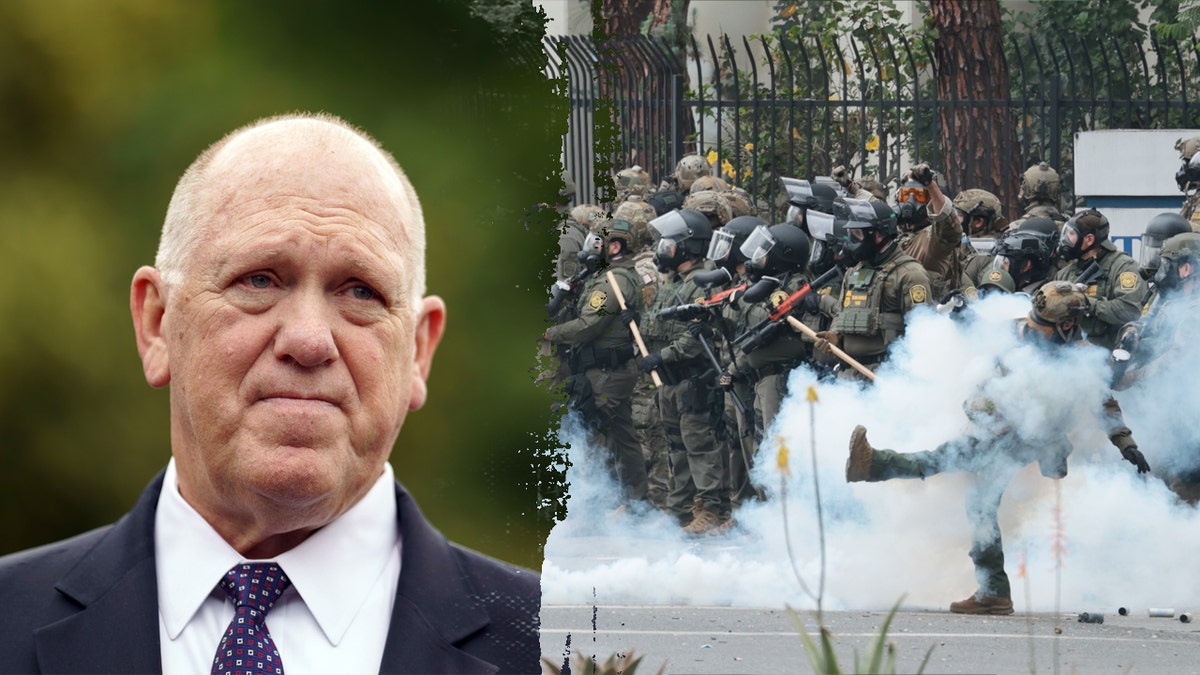
U.S. border czar Tom Homan responded to the ICE riots in LA during a recent appearance on MSNBC. (Getty Images)
«The President of the United States just called for the arrest of a sitting Governor,» Newsom said Monday in a post on X. «This is a day I hoped I would never see in America. I don’t care if you’re a Democrat or a Republican this is a line we cannot cross as a nation — this is an unmistakable step toward authoritarianism.»
Meanwhile, Homan appeared to soften his original statement, saying an arrest would only happen if a crime were committed by Newsom and Bass.
«Well, that whole thing’s been taken out of context,» Homan said. «They haven’t crossed a line yet, but like any other U.S. citizen, if you cross that line, I don’t care who they are. The governor, the mayor, whatever — when you commit a crime against ICE officers, we will seek prosecution.»
Newsom, who was first elected governor in 2018 and was re-elected in 2022, has drawn the ire of Trump for how he’s handled multiple issues in his state, including the wildfires that ravaged Los Angeles in January.
FEDERAL OFFICIALS SLAM DEMOCRATS FOR ‘DANGEROUS’ RHETORIC AS ICE AGENTS FACE VIOLENT MOBS IN LA, NYC

California Gov. Gavin Newsom and President Donald Trump meet in January during the wildfires in Los Angeles. (Pool)
The two have sparred over Trump’s decision to deploy thousands of National Guard troops and 700 Marines to California after protests launched Friday in response to recent arrests in the city by U.S. Immigration and Customs Enforcement.
While Trump has argued the National Guard troops are necessary to prevent destruction in Los Angeles, Newsom has said the deployment violated California’s state sovereignty. State governors usually oversee National Guard troops, but Trump invoked a law to place the troops under federal command so he could circumvent Newsom.
On Monday, Newsom said most of the troops «are sitting, unused, in federal buildings without orders.»
«This isn’t about public safety,» Newsom said in a Monday post on X. «It’s about stroking a dangerous President’s ego.»
The Associated Press contributed to this report.
INTERNACIONAL
Una solución equilibrada al debate sobre el ‘zero rating’ en Colombia

(Imagen Ilustrativa Infobae)
En los últimos días, el fallo de la Corte Constitucional sobre la práctica del zero rating en los planes de telefonía móvil ha generado un intenso debate. Esta decisión, que prohíbe a los operadores ofrecer acceso gratuito y exclusivo a ciertas aplicaciones como WhatsApp o Facebook, busca, según la corte, proteger la neutralidad de la red, un principio que garantiza que todos los contenidos en internet sean tratados por igual. Sin embargo, el tema no es tan sencillo como parece, y su análisis no puede ser generalizado.
Como ciudadanos, necesitamos entender el fallo de manera clara y reflexionar sobre cómo abordarlo sin perjudicar a los usuarios, especialmente a los más vulnerables. Mi propuesta es simple: en lugar de implementar medidas generales que afectan a todos por igual, las restricciones deben aplicarse caso por caso, solo cuando se demuestre una distorsión en el mercado móvil o un abuso de la posición del mercado de un operador de ese servicio. En ese entendido, deben ser los organismos reguladores los llamados a aplicar las medidas del caso que deben ser proporcionales y temporales mientras se corrigen las fallas del mercado.
La Corte, en su sentencia del 30 de mayo de 2025, declaró inconstitucional una parte del artículo 56 de la Ley 1450 de 2011, que permitía a los operadores de telefonía móvil ofrecer planes donde ciertas aplicaciones no consumen datos del usuario. Esta práctica, conocida como zero rating, fue cuestionada porque, según los demandantes, viola la neutralidad de la red.
¿Qué significa esto? Que los operadores no deben decidir qué aplicaciones o servicios tienen prioridad en internet, ya que todos los contenidos deben estar disponibles en igualdad de condiciones. La Corte dio un año a las empresas para ajustar sus planes, asegurando que cualquier beneficio de datos gratis se ofrezca de manera neutral, sin privilegiar aplicaciones específicas.
El fallo responde a una preocupación válida: cuando un operador decide qué aplicaciones son gratuitas, puede limitar la libertad de los usuarios para elegir qué consumir en internet. Por ejemplo, si WhatsApp no consume datos, pero una aplicación local de mensajería sí, los usuarios podrían verse empujados a usar solo WhatsApp, afectando la competencia y la diversidad de opciones.
Sin embargo, el zero rating también ha permitido que millones de colombianos, especialmente en zonas rurales o de bajos ingresos, accedan a aplicaciones esenciales sin gastar su saldo.
Este es el dilema: ¿cómo protegemos la neutralidad sin sacrificar el acceso a internet de los más necesitados?
El fallo de la Corte es un paso importante para defender los derechos digitales, pero plantea un desafío: no todas las prácticas de zero rating son abusivas ni restrictivas del mercado móvil. Por eso, creo que no podemos analizar este tema de manera general, aplicando una misma regla para todos los casos. Una medida que prohíbe el zero rating sin distinguir entre situaciones específicas puede tener consecuencias no deseadas, como encarecer el acceso a internet para quienes dependen de estos planes, que en Colombia representan el 76% de los usuarios móviles.
Estos temas no deben ser tratados en fallos judiciales. La constitución y la ley en nuestro país, ha creado organismos modernos que toman decisiones técnicas que son los llamados manifestarse. La Comisión de Regulación de Comunicaciones (CRC), como ente regulador, debe evaluar si un operador está abusando del mercado al ofrecer ciertas aplicaciones gratis. Por ejemplo, si una empresa favorece a una red social en detrimento de otras para obtener beneficios económicos o limitar la competencia, entonces sí debe intervenirse. Pero si el zero rating se usa para facilitar el acceso a internet sin dañar el mercado, no debería prohibirse de manera automática. Una regulación inteligente debe medir el impacto real de cada práctica antes de restringirla.
El fallo de la Corte Constitucional nos invita a reflexionar sobre cómo construir una internet más justa y accesible en Colombia. Pero las soluciones no pueden ser de talla única. Prohibir prácticas como el zero rating sin analizar cada caso puede generar más problemas que beneficios, especialmente para quienes dependen de estos planes para estar conectados. Invito a los operadores, al gobierno, a la sociedad civil y a los ciudadanos a dialogar sobre cómo garantizar la neutralidad de la red sin dejar atrás a los más vulnerables.
Hagamos de esta discusión una oportunidad para fortalecer el acceso a internet como un derecho, no como un privilegio. Porque en un mundo cada vez más digital, estar conectados no es un lujo, es una necesidad.
Ahora, en el entendido de que el internet en nuestro país es un servicio público esencial que además, la red que lo soporta fue declarada de utilidad pública e interés social gracias a la ley 2416 de mi autoría, es absolutamente claro que quien tiene la obligación de que el servicio llegue a todas partes y su acceso sea igual para todos los colombianos es el Estado.
Por tal razón, mi propuesta es que, de la misma manera que es subsidiado el servicio de energía y el servicio de agua potable a los sectores más vulnerables, también se destinen recursos para subsidiar paquetes básicos que permitan a esta población acceder a internet. Esta sería una medida que nos permitirá avanzar en la inclusión digital y en la igualdad de derechos de todos en el ciber espacio.
Medidas como estas, sumadas a un ambicioso plan de digitalización de Estado y nuestra economía, ayudarían mucho a que podamos montarlos en la ola de la cuarta revolución industrial, marcada por el desarrollo de la inteligencia artificial, la cual lidera las tasas de crecimiento de las economías más fuertes del mundo.
De esta manera, en lugar de centrarnos en prohibiciones, transformaríamos el debate en una oportunidad para democratizar el acceso a internet para todos.
-

 POLITICA1 día ago
POLITICA1 día agoCristina Kirchner habla en sede del PJ a la espera de la decisión de la Corte Suprema por la causa Vialidad
-
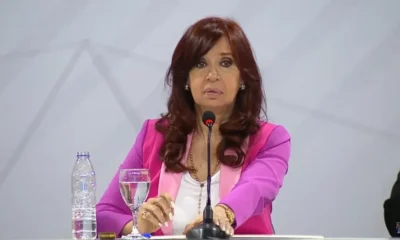
 POLITICA9 horas ago
POLITICA9 horas agoCristina Kirchner fue condenada a seis años de prisión e inhabilitación perpetua para ejercer cargos públicos
-

 POLITICA2 días ago
POLITICA2 días agoAnte la posible condena de la Corte contra CFK, dirigentes kirchneristas convocaron a una reunión urgente

















